Journalists’ organisations across Pakistan have strongly condemned recent amendments to the Prevention of Electronic Crimes Act (PECA), raising concerns over the lack of consultation and the potential threat to press freedom.
A joint action committee comprising the Pakistan Federal Union of Journalists (PFUJ), All Pakistan Newspapers Society (APNS), Council of Pakistan Newspaper Editors (CPNE), Association of Electronic Media Editors and News Directors (AMEND), and the Pakistan Broadcasters Association (PBA) issued a statement rejecting the amendments and calling for their immediate withdrawal.
The committee highlighted that the amendments were introduced without consulting media stakeholders, a move they deemed “unacceptable.”
The PFUJ, in a separate statement, criticised the amendments as deceptive. PFUJ President Afzal Butt and Secretary General Arshad Ansari described them as unnecessary and a violation of constitutional rights, claiming they were a calculated effort to stifle the media, social media platforms, and the broader journalistic community.
The Karachi Press Club (KPC) also expressed strong objections, condemning the amendments as a serious threat to freedom of expression.
KPC President Fazil Jamili and Secretary Sohail Afzal Khan underscored that Article 19 of Pakistan’s Constitution guarantees every citizen the right to freedom of speech. They criticized the government for bypassing stakeholders in the decision-making process and demanded that the law be repealed.
The KPC proposed empowering mainstream media to provide real-time, accurate reporting while tackling misinformation on social media through inclusive legislation that involves all stakeholders.
The amendments, introduced in the National Assembly under a supplementary agenda, propose establishing a Digital Rights Protection Authority (DRPA) with extensive powers to remove online content, block prohibited material, and impose penalties on individuals sharing such content.
These changes broaden the definition of “social media platforms” to include tools and software used to access them and expand the law’s reach to websites, applications, and communication channels.
Additionally, the amendments recommend disbanding the FIA Cybercrime Wing and replacing it with stricter penalties. For example, sharing expunged material from parliamentary or provincial assemblies on social media could lead to up to three years of imprisonment and a fine of Rs2 million.
During the bill’s presentation in the National Assembly, journalists staged a protest, walking out of the press gallery in defiance.
The KPC and other organisations have called for the “black law” to be repealed immediately and announced plans to decide on their next steps through consultations.
The amendments have triggered widespread criticism, with opponents labelling them an attack on press freedom and freedom of expression. They have urged the government to involve media bodies and civil society representatives in drafting any legislation impacting digital and press rights.
Read more: Vehicle Registration Now Simplified Across All Punjab Districts





